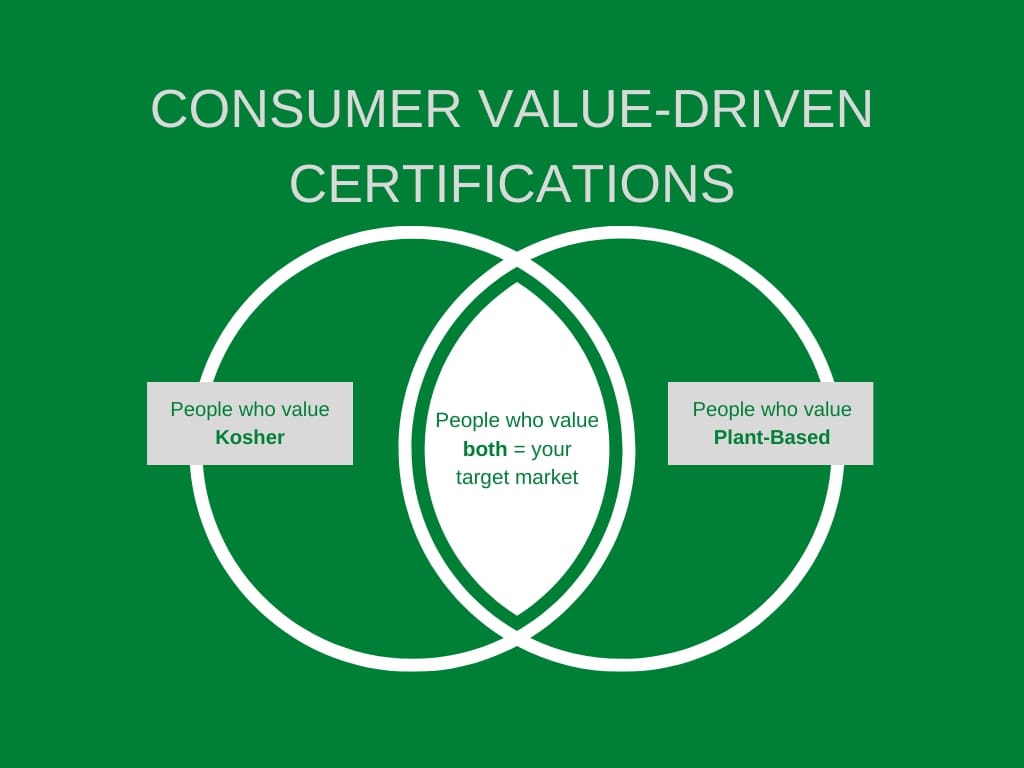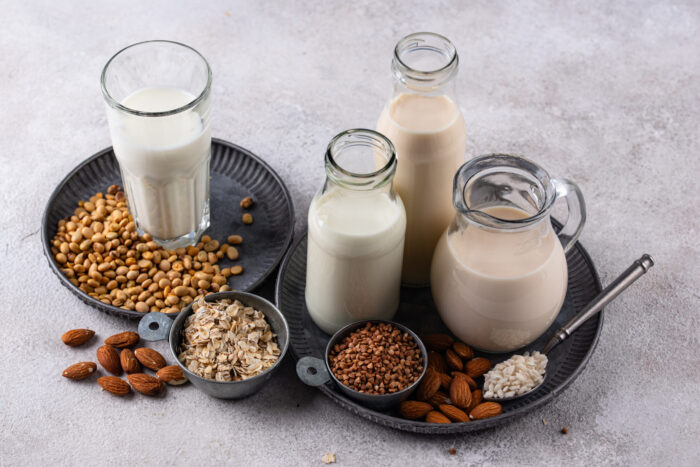
What’s all the hype with classifying foods as plant-based?
From meat replacements, to vegan cheeses and everything non-animal in between, ‘plant-based’ has become a staple household term by now. Even products with no likeness to anything of animal origin seem to beat this claim on their labels. If you think labelling some products this way is a statement of the obvious, then you’re not alone. We all know that a crunchy, twisted snack made from wheat flour, water and salt is quite simply a pretzel, and doesn’t seem to elicit further clarification. Yet it won’t enter the carts of a growing sector of consumers without a little added encouragement. Especially if its neighbor on the shelf does bear a ‘plant-based’ mark.
Kosher, the ancient diet with modern application and global appeal, already claims about 40% of the total manufactured foods space – that isn’t news. And as the world’s largest independent kosher agency, we’ve been working with an increasing number of plant-based companies pursuing kosher certification in recent years.
Let’s dig in for a more detailed look at the plant-based movement, and why manufacturers are eager to combine the claim with kosher as part on the label. Learn how this combination could be a boon for marketing anything from pretzels to burgers(!).
Wait…isn’t it Called Vegetarian? Or, is it Vegan?
In short, plant-based is a more inclusive term when referring to an individual’s diet. A variety of food makers and eaters wholeheartedly embrace this category. This includes those subsisting on foods across the vegetable-animal spectrum. Terms like flexitarian and reductitarian enter into the picture to describe consumers’ complicated relationship to consuming animal products.
When applied to food products, however, plant-based represents a more exacting rubric than vegetarian, or even vegan standards. Vegetarian describes a product excluding animal meat, while vegan refers to the same, but with the further exclusion of animal-derivatives, such as dairy, eggs, and even honey. With those consumers who may be reluctant to limit themselves so much, the plant-based movement finds a following. And for food labeling, the plant-based notion comes as a semantic middle ground. It represents a more subtle shift from the typical western diet towards a more vegetable-rooted one.
The Inclusivity of Plant-Based.
In recent years, this approach has appealed to a very broad swath of consumers. The Plant Based Foods Association notes:
“In the U.S. 39 percent of consumers are trying to eat more plant-based foods while only 3 percent are vegan. Vegan is a specific lifestyle and label, while plant-based can include a wider array of people…”[1]
In place of completely foregoing animal fare, while still resolving to eat more veggies, consumers identify more readily with a plant-based eating lifestyle.
And as always, consumer trends flow upward toward the companies that they buy from, so food manufacturing companies and restaurants are following suit. As nytimes.com puts it:
“The number of food and drink products made in the United States that use “plant-based” in their labeling spiked 287 percent between 2012 and 2018, according to the consumer research firm Mintel.”[2]
Furthermore, as at-home eating increased dramatically during the the COVID-19 pandemic’s beginnings in the US, plant-based product sales shot up right along with it.
As cited by a report put out jointly by The Good Food Institute (GFI), The Plant-Based Foods Association (PBFA) and SPINS, sales of plant based meat replacemens went up a staggering 45% – hitting $1.4 billion in 2020 alone.
From a regulatory perspective, seeing a plant-based claim on a product label represents more than just vegan. Where a Vegan label represents an assurance of what’s not in the product, plant-based functions to emphasize what is; namely, ingredients that grow from the Earth, and therefore are not artificial. This difference enables plant-based foods to stand apart, with a distinct meaning and focus. But before delving further into its market significance, you may be wondering about where plant-based began.
Who Invented ‘Plant-Based?’
As we mentioned, plant-based eating constitutes somewhat of a compromise between the typical meat-heavy diet and a full-on vegetarian one. However, the term has a slightly different origin. In the context of an academic presentation on the benefits of a vegetable-rich diet, plant-based was coined by biochemist Thomas Colin Campbell around 1980. He used it in place of the term vegetarian, establishing his stance as a scientific one focused on nutrition, avoiding implications regarding animal welfare.
Fast-forward a few decades, and Campbell’s 2016 book The China Study brought his findings into the public eye, popularizing the philosophy far more widely. In recent years, perhaps the most common use of the plant-based designation has been in food marketing to categorize meat and dairy substitutes. This came in response to the then widespread notion that protein can only be gained from eating animals (more on this later on in this post). Thus, beyond Campbell’s original intention with the name, plant-based has since been adopted by several special interest groups, including those driven by animal welfare, environmental activism and, even food safety. Today, Campbell sits on the board of his own outreach organization aimed at educating consumers and certifying companies to promote a plant-based lifestyle.
The Emergence of Plant-Based Certification.
With the steep growth of the plant-based foods sector, executives from a handful of food brands saw the need for organized representation. While more than one agency offers plant-based certification services, a prolific and pioneering one is the Plant Based Foods Association (PBFA), formed in 2016. Their work to date has addressed various needs that plant-based food brands are facing. These include lobbying for labeling legislation, building networking opportunities, and providing marketing resources to companies. Most significant to our discussion, though, is the certification wing, which entails third-party verification via the National Sanitation Foundation (NSF). We’re regulatory people, so we like to look at the benefits of different certifications and how layering them strategically can bolster companies.
Defining Plant-Based.
For the purposes of product certification, the PBFA defines a plant-based food as:
“…a finished product consisting of ingredients derived from plants that include vegetables, fruits, whole grains, nuts, seeds and/or legumes (peas, beans, pulses, etc.). Additionally, fungi and algae, although not technically plants, will also be counted towards the percentage of plant-based ingredients.”[3]
Like us, you may be thinking that many food products fall under that description. Similarly, you may not think being plant-based is such a differentiator, but get this: In conjunction with a major research organization, PBFA noted:
According to newly-released data from SPINS, the leading retail sales data company for the natural and specialty products industry, the total market for this sector…tops nearly $3.5 billion in sales. The category includes plant-based versions of meat, tofu, milk, yogurt, cheese and cream, and has grown more than 8.7% over the last two years. By comparison, general food and beverage sector growth has been just 3.7% over the same period.[4]
Furthermore, in a 2018 study, the global analytics company Nielson found that 39% of Americans (who don’t identify as vegans or vegetarians) actively try to incorporate more plant-based foods into their diets. So there’s clearly reason to spotlight and certify your products if they qualify. These labels grab consumers’ attention who are looking for verified assurance that they’re not eating animal or synthetic ingredients.
Strategic Marketing with Plant-Based.
While it’s well-known that lifestyle commitments directly affect people’s buying choices, there’s room for skepticism over how consumers make their decisions in a moment of choice. You may not think food labels posing their contents as somehow healthier or more natural than those without the plant-based badge are swaying you. However, marketing magic has always favored the subconscious. For the majority of the U.S. consumer set, our brains automatically make the association that a plant-based item as a better buying choice. To confirm this theory, the PBFA recently conducted an in-store experiment in 2020 in conjunction with Kroger and data and market analytics provider SPINS, displaying plant-based meat and dairy alternatives in the meat section of the store. The staggering results showed that the plant-based product sales significantly outpaced both animal-based parallel products, as well as overall food sales.
So What Does Kosher Have to Do With It?
Simply put, plant-based and Kosher go together like Pareve and…anything! Stacking certifications effectually overlaps the values that can match your target customers. It’s a best practice in food marketing and has proven, significant ROI. Plant-based certification, in particular, makes a great pairing with kosher to broaden the product’s appeal. Here are just a few reasons why:
Consumers Usually Have a Primary
An individual may be interested in the standards of several different certifications. However, there usually is one value that’s most important to someone. To include as many consumers’ primary value as possible, you need to be strategic. For instance, a label claiming “vegetarian” won’t cut it for someone who prefers not to consume dairy. So becoming certified Kosher-Pareve on top of claiming “vegetarian gives them that assurance.
Furthermore, on top of knowing a product is both vegetarian and Kosher-Pareve, if someone wants to be sure they’re not consuming any eggs (which are both vegetarian and Pareve), then a plant-based certification may be their best bet in attracting those clients.
Overlapping Unlocks a Common Ground
Imagine a consumer who keeps an all-kosher diet for religious reasons (making it non-negotiable), but wants to limit their consumption of unnatural additives. Kosher certification can cover a variety of ingredients, including flavors, fragrances, and preservatives developed in a lab. Vegan verification will assure a certain segment of consumers of a non-animal-derived product. However, plant-based will actually certify the absence of any artificial additives. This way, adherents to both kosher and all-natural values, and those who prefer to keep both, will appreciate a product with these two certifications.
Think of it as a simple Venn diagram:

For the Love of Meat Alternatives.
Another goal that the plant-based ethos represents is lessening the strain of meat and dairy production on the world. This may be the most important for many plant-based consumers these days. But morals aren’t always a match for someone’s desire to enjoy a nice, juicy burger. In certifying the famous plant-based protein brand Beyond Meat, we learned about the implications meat production puts on the environment. Once their OK Kosher status went viral, we received a flood of emails from delighted consumers who only eat kosher. Adding the possibility for great protein-rich main dishes at home without contributing to this global dilemma was a plus.
It’s easy!
The simplest reason to go kosher and plant-based in tandem is simply that it’s so, incredibly doable. Plant-based certification will automatically preclude meat or dairy products. And since meat and dairy are sensitive categories in kosher, an animal-free product is likely to be eligible for certification. Furthermore, a foundation of kosher certification is the segregation of meat and dairy. So any plant-based certified product can breeze through this step, saving time and cost. Though OK Kosher will individually verify ingredients and processes, as we never piggyback on any other certifier’s findings. However, given the plant-based baseline, we know that the kosher program won’t be a challenge to design. As mentioned, but worth emphasizing, this usually saves on the cost to the company on their kosher certification.
These examples are a mere sampling of the motivation consumers can have when making their selections. However, there are seemingly countless other combinations that go into consideration in this way. That’s why some of the most successful brands use combined certifications to grow their sales.
Where is Plant-Based Headed?
Although you can successfully pair kosher certification with almost any other program, we’re pretty excited about plant-based. With the issues of health, animal welfare, and environmentalism on the rise, values-based certifications like kosher and plant-based can increase greatly. Kosher has seen a sustained and stable growth rate every year. The kosher food market struck a value of $19.1 billion in 2018. It’s projected to reach $25.6 billion by 2026.[5] U.S. retail sales of plant-based foods grew 11.4 percent in the past year. That brings the total plant-based market value to $5 billion.[6]
Is the plant-based label just a catchphrase? The answer, perhaps, doesn’t even matter. That’s exactly what’s behind this label distinction; a simple reminder that the package contents are all made from plants. The appeal is straightforward; making an effort to eat more foods made from plants, and less of the other category, could impact our bodies and our world positively. Simple in theory, but has a big impact on consumer habits. And with the already-powerful demand for kosher, achieving both values is a win-win for your company.
[1] https://plantbasedfoods.org/how-is-pbfas-certified-plant-based-seal-different-from-vegan/.
[2] Ethan Varian, “It’s Called ‘Plant-Based,’ Look It Up,” nytimes.com, 2019.
[3] https://plantbasedfoods.org/marketplace/certification/.
[4] https://plantbasedfoods.org/leading-plant-based-food-companies-form-first-ever-trade-association/.
[5] https://www.alliedmarketresearch.com/kosher-food-market-A06022.
[6] https://plantbasedfoods.org/marketplace/retail-sales-data/.
The information presented in this blog post is based on research, general knowledge, and/or the author’s understanding of the subject matter. This blog is provided for informational purposes only and should not be relied upon by the reader or considered as professional advice. For specific guidance on any given topic, the reader should consult a qualified professional in the given field. OK KOSHER DISCLAIMS ANY LIABILITY FOR ANY LOSS OR DAMAGES RESULTING FROM RELIANCE ON THE INFORMATION PROVIDED IN THIS ARTICLE.


 EN
EN  ZH
ZH  KR
KR  BR
BR  ES
ES  IN
IN  IL
IL  JP
JP 



